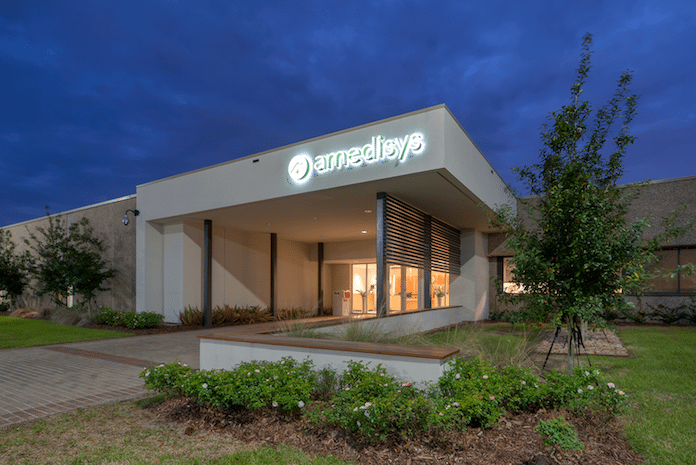“Workforce optimization” is the watchword at Baton Rouge, La.-based Amedisys Inc. (NASDAQ: AMED).
The company seeks to build clinical capacity to support its long-term expansion, expecting to achieve growth at a higher rate than a projected 7% to 8% for the overall hospice market, according to President and COO Chris Gerard.
With labor pressures the hospice industry’s biggest headwind, Amedisys is laying the groundwork with a focus on recruitment and retention, augmented by efforts to maximize productivity among the workforce it already employs.
“The labor situation is probably the worst it’s been in a while, if not forever. Being able to work through that is going to require the post-acute care space to really be nimble around how you get more out of your labor,” Gerard told the audience at the Barclays Global Healthcare Conference. “That’s why workforce optimization is a key strategy for us. It’s going to be unlocking capacity with our existing clinical staff, as well as being able to try to grow our capacity over time.”
Gerard will succeed current CEO Paul Kusserow at the end of April. Kusserow will remain the company’s chairman.
Amedisys doubled down last year on efforts to attract and keep employees, particularly clinicians.
The company has been surveying employees to gauge their satisfaction in the workplace and conducts regular focus groups of about 50 people.
Also in 2021, Amedisys began implementing a predictive-analytics system to reduce turnover. This technology predicts with 85% accuracy the likelihood that an employee might leave the organization within the following eight weeks, Gerard said at Barclays.
Amedisys saw progress in Q4 2021. The company saw a 27% increase in recruitment headcount in the quarter and reported 9% decline in nurse turnover.
Amedisys builds turnover into incentive plans for local clinical leadership “all the way up to the C-Suite,” Gerard said. The company also sets monthly recruitment targets and measures its performance over time using those data.
“We’re obsessive on retention. We feel like the most impactful lever in our organization is retaining our clinical staff, … and you can leverage that capacity on organic growth and taking care of your patient,” Gerard said. “This is something that we live and breathe every single day to make sure that we have clinical capacity.”
Clinical capacity has also driven some of the company’s most recent external investments. Amedisys is buying stakes in companies that could help drive efficiency or support their core businesses.
A recent example is the provider’s investment in connectRN.
A Waltham, Mass.-based staffing company, connectRN historically has focused on the skilled nursing industry. Amedisys is working with that team to develop its home health- and hospice-specific capabilities.
Amedisys in January participated in a Series F round that infused connectRN with a total $76 million. Suvretta Capital Management and Avidity Partners led the round, with Amedisys and other investors also holding a stake. Amedisys did not disclose the dollar amount of its investment.
connectRN helps nurses and aides find work across health care settings. Its services include flexible-shift scheduling, career-development resources and more. These considerations are frequently occurring priorities for many job-seeking clinicians.
The startup expects to deliver nearly 240% in year-over-year organic revenue growth, according to the company.
“We invested in that organization, and we are alongside them working to co-develop a gig opportunity for the home health and hospice space,” Gerard said. “They get a full day’s work, and they get a full day’s pay. We’re optimistic that we’re going to unlock something out there that allows us to basically turn on and turn off nursing whenever we have short-term unexpected needs.”
Last May, Amedisys was one of several home health and hospice giants that joined Chicago-based investment firm The Vistria Group’s recapitalization of Medalogix and Muse Healthcare.
LHC Group (NASDAQ: LHCG) and Encompass Health Corp. (NYSE: EHC) also bought into the tech firms, which later consolidated under the Medalogix brand.
Amedisys recently reported that the Medalogix Care application helped the company speed its revenue cycle process by 40%.
Acquisitions will remain a pillar to Amedisys’ growth strategy, though for 2022 the company’s deal pipeline may be weighted more towards home health.
Co-locating its business lines is a priority for Amedisys as it considers acquisition targets. The company also examines claims data to gauge referral rates and evaluates the competitive landscape of the local market.
Here, too, the staffing question becomes paramount. Gerard said that “there’s a premium” for a favorable labor market surrounding an acquisition target.
“It’s a multi pronged approach to be able to find ways to enter into new markets,” Gerard said. “In our predominant strategy for hospice for the last couple of years, after we did 19 to 20 deals, we have a list of probably about two dozen de novo sites that we would like to enter into if we don’t find acquisitions. We have a pretty good roadmap to be able to expand our footprint.”
Companies featured in this article:
Amedisys, Avidity Partners, Barclays, connectRN, Encompass Health Corp., LHC Group, Medalogix, Muse Healthcare, Suvretta Capital, The Vistria Group



